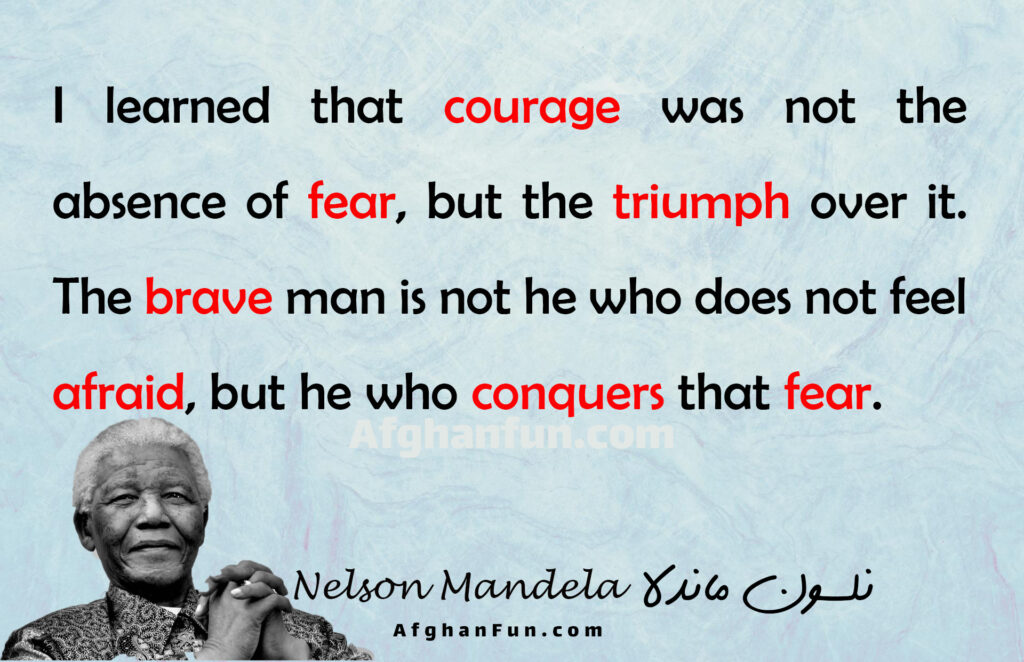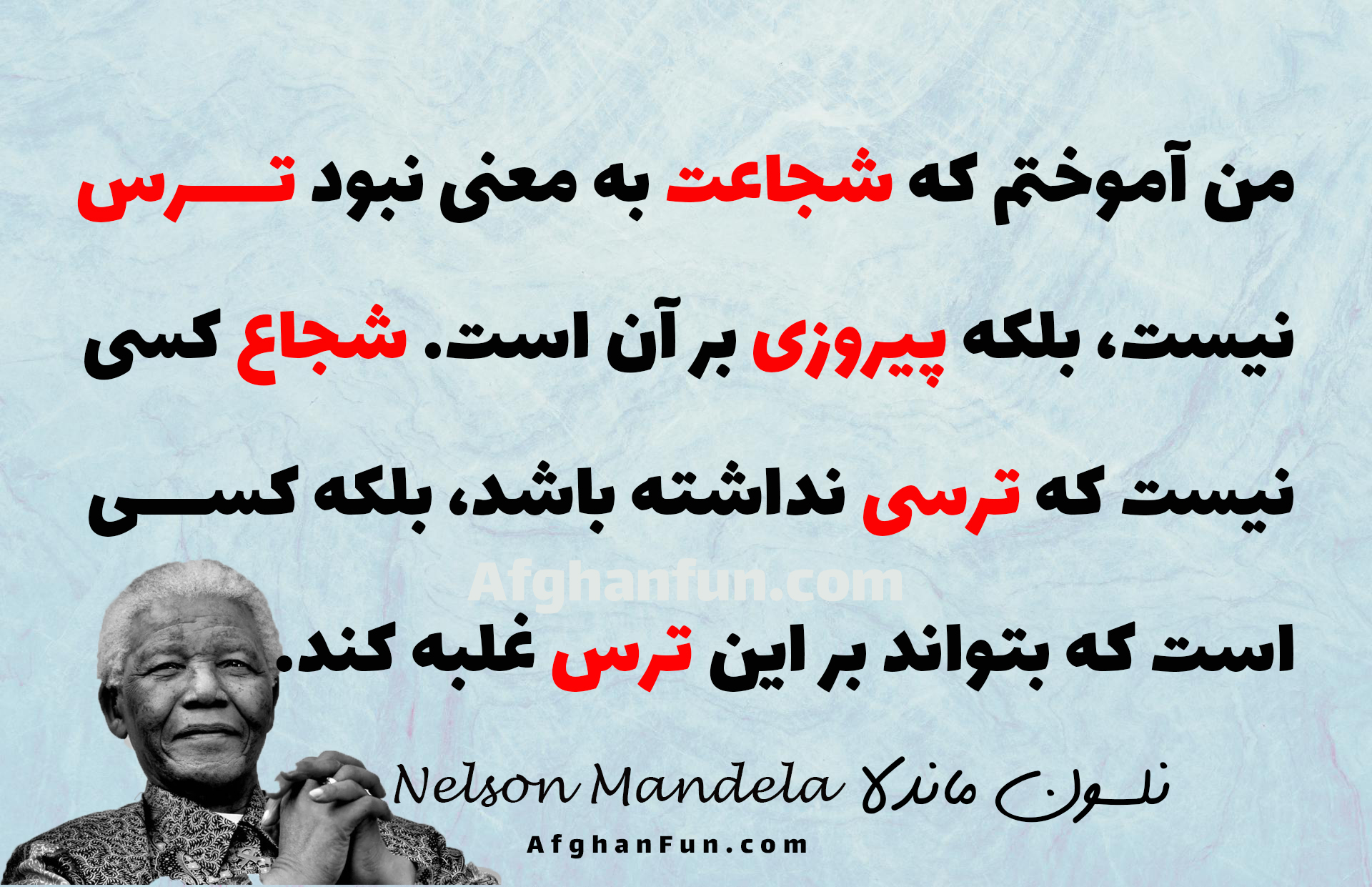
I learned that courage was not the absence of fear, but the triumph over it. The brave man is not he who does not feel afraid, but he who conquers that fear.
Nelson Mandela
Ман фаҳмидам, ки далерӣ набудани тарс нест, балки ғалаба бар он аст. Далер касе нест, ки тарс надорад, балки касест, ки ин тарсро паси сар карда метавонад.
Нелсон Мандела
Ин ҷумла ба мо мегӯяд, ки доштани тарс як ҳолати табиӣ аст ва ҳамаи одамон онро эҳсос мекунанд. Ҷуръати воқеӣ дар он аст, ки бо вуҷуди ин тарс, ба сӯи орзуҳои худ ҳаракат кунем ва аз мушкилот натарсем.
من آموختم که شجاعت به معنی نبود ترس نیست، بلکه پیروزی بر آن است. شجاع کسی نیست که ترسی نداشته باشد، بلکه کسی است که بتواند بر این ترس غلبه کند.
نلسون ماندلا
این جمله به ما میگوید که داشتن ترس امری طبیعی است و همه انسانها آن را تجربه میکنند. شجاعت واقعی در این است که با وجود این ترس، به سمت رویاهایمان حرکت کنیم و از چالشها نترسیم.
لقد تعلمت أن الشجاعة ليست في غياب الخوف، بل في الانتصار عليه. الشجاع ليس من لا يخاف، بل من يستطيع أن .يتغلب على خوفه
نيلسون مانديلا
تخبرنا هذه العبارة أن الخوف أمر طبيعي يشعر به جميع الناس. الشجاعة الحقيقية تكمن في المضي قدمًا نحو أحلامنا والتغلب على التحديات رغم وجود هذا الخوف.
Nelson Mandela’s quote, “I learned that courage was not the absence of fear, but the triumph over it. The brave man is not he who does not feel afraid, but he who conquers that fear,” is a profound reflection on the true nature of courage. Here’s a detailed analysis of the quote:
1. Redefining Courage
“Courage was not the absence of fear”: Mandela challenges the traditional notion that courage is simply the absence of fear. Many people mistakenly believe that being brave means having no fear at all, but Mandela redefines courage as something much more complex and profound. Fear is a natural human response to danger, uncertainty, or the unknown, and to be human is to feel fear at times.
By emphasizing that courage is not the absence of fear, Mandela acknowledges that fear is an inherent part of the human experience. It’s not something to be ashamed of or something that can always be avoided. Fear, in this sense, becomes a starting point for what it means to act bravely. Courage is not the lack of fear, but the ability to continue moving forward in spite of it.
2. The Triumph Over Fear
“But the triumph over it”: The second part of the quote focuses on the idea of overcoming fear. Triumphing over fear doesn’t mean eliminating it, but learning to live with it and make choices despite it. This is the essence of bravery: acting in the face of fear, not because the fear isn’t there, but because one has the strength to confront and rise above it.
Mandela’s life, especially his experiences in prison, serves as a powerful example of triumphing over fear. For many years, he lived under the constant threat of violence, injustice, and death. Yet, despite the physical and emotional toll, he maintained his resolve. His courage was not about being fearless, but about choosing to stand up for what he believed in despite the overwhelming fear that could have immobilized him.
3. Bravery is Action, Not Absence
“The brave man is not he who does not feel afraid”: Mandela reaffirms that bravery does not equate to a lack of fear. Everyone feels fear at different points in their life, whether it’s fear of failure, fear of the unknown, or fear of personal harm. Bravery isn’t about eliminating those fears, but rather acknowledging them and still choosing to act.
This idea is empowering because it suggests that bravery is accessible to everyone. Anyone can be brave, even if they feel fear, as long as they push through it and take action in the face of adversity.
4. Conquering Fear as an Act of Strength
“But he who conquers that fear”: Mandela points out that the true mark of bravery is not in avoiding fear, but in confronting and mastering it. The idea of conquering fear suggests a deep inner strength — the strength to act with integrity, despite the emotional turbulence fear can bring.
To “conquer” fear is not to eliminate it, but to control it. Fear can paralyze us, preventing us from taking action or making decisions. To conquer fear is to accept it, understand it, and move forward regardless. In Mandela’s case, his fear of oppression, imprisonment, and death could have prevented him from becoming the leader he was, but instead, he allowed his commitment to justice to guide his actions.
5. Mandela’s Personal Example
This quote reflects Mandela’s own experiences and struggles. For much of his life, he faced an oppressive apartheid system, and he was arrested, sentenced to life imprisonment, and subjected to immense hardship. Throughout these challenges, Mandela did not allow fear to stop him from fighting for what he believed in — racial equality, justice, and human dignity.
His ability to endure 27 years of imprisonment and still emerge as a leader of peace and reconciliation is a testament to his triumph over fear. He faced many dangers — personal, political, and physical — but never allowed fear to prevent him from achieving his vision of a democratic South Africa.
6. Fear as a Motivator
Fear, when properly understood and channeled, can also serve as a motivator for action. Mandela’s fear of injustice, inequality, and the suffering of his people likely fueled his determination to bring about change. In this sense, fear didn’t weaken him, but strengthened his resolve to act courageously for a cause greater than himself.
7. A Universal Message
Mandela’s message is universally applicable. Anyone, from everyday individuals to world leaders, can relate to the idea that fear is a natural part of life. His words remind us that courage is not about the absence of fear, but the ability to act in spite of it.
This idea resonates with anyone who has ever faced a daunting challenge, whether it’s standing up for what’s right, confronting personal fears, or making difficult decisions. Courage is found not in the absence of fear, but in overcoming it.
Conclusion:
Nelson Mandela’s quote redefines bravery and courage by emphasizing that they are not the absence of fear, but the ability to face and overcome it. He teaches that fear is not a weakness but a natural part of being human. True courage comes from acknowledging fear, confronting it, and choosing to move forward despite it. Mandela’s own life stands as an exemplary model of this form of bravery, showing that even in the face of unimaginable fear and hardship, one can still make bold and meaningful decisions that change the world.
This quote encourages us to view fear not as an obstacle to success but as a part of the journey that can ultimately lead to personal growth and achievement. It is through the act of conquering our fears that we become stronger, braver, and more capable individuals.
Nelson Mandela: A Symbol of Hope and Reconciliation
Nelson Rolihlahla Mandela (18 July 1918 – 5 December 2013) was a South African anti-apartheid revolutionary, politician, and philanthropist who served as the first president of South Africa from 1994 to 1999. He was the country’s first black head of state and the first elected in a fully representative democratic election.
Early Life and Activism
Born into the Xhosa royal family in Mvezo, South Africa, Mandela became involved in anti-apartheid politics in his youth. He joined the African National Congress (ANC) in 1944 and became a prominent figure in the organization’s struggle against racial segregation and discrimination.
Imprisonment and Leadership
Mandela’s activism led to his imprisonment in 1962, and he spent 27 years in prison, including 18 years on Robben Island. During his imprisonment, he became an international symbol of resistance against apartheid. Despite his incarceration, he continued to inspire millions around the world and remained a powerful voice for freedom and justice.
Release and Presidency
After his release from prison in 1990, Mandela played a pivotal role in dismantling the apartheid system and establishing a democratic South Africa. He negotiated with the white minority government and led the ANC to victory in the country’s first multiracial elections in 1994. As president, he worked tirelessly to heal the deep divisions caused by apartheid and to build a new nation based on equality and reconciliation.
Legacy
Mandela’s legacy is one of peace, justice, and human rights. He is widely regarded as one of the greatest leaders of the 20th century, and his unwavering commitment to equality and reconciliation continues to inspire people around the world.
Key Accomplishments and Contributions
- Abolition of Apartheid: He played a crucial role in dismantling the oppressive apartheid regime in South Africa.
- Promotion of Reconciliation: He fostered racial reconciliation between black and white South Africans.
- Global Advocate for Human Rights: He became a global icon for peace and social justice.
- Nobel Peace Prize: He was awarded the Nobel Peace Prize in 1993, along with F. W. de Klerk.
Nelson Mandela’s life and work continue to be a beacon of hope and a reminder of the power of human spirit to overcome adversity and achieve a more just and equitable world.











